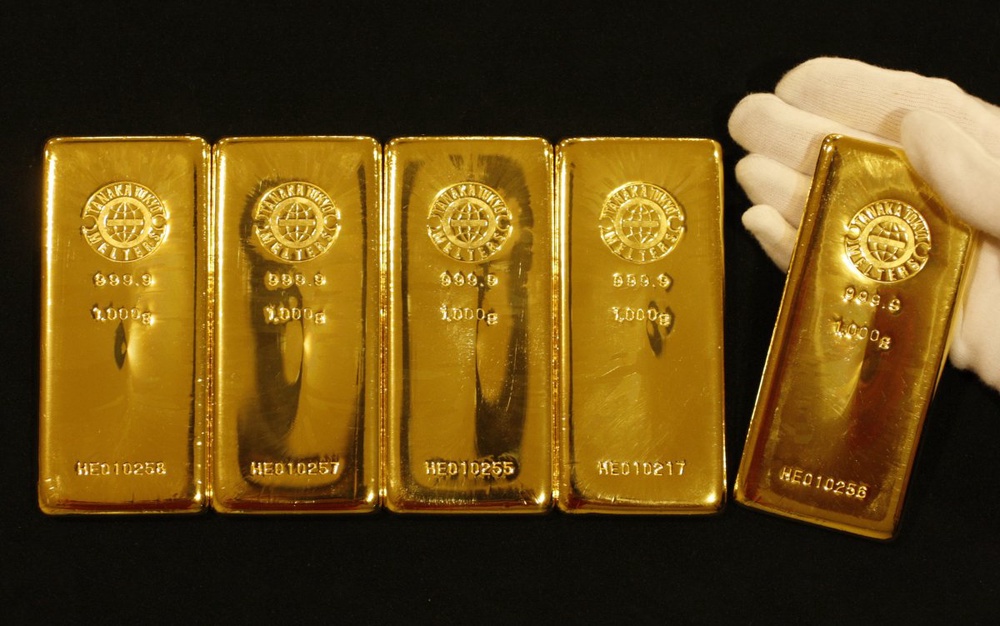
South Korea launched a gold trading exchange for the first time on Monday in a bid to help counter the country's burgeoning black market in the precious metal, AFP reports. Smuggled gold is traded secretly through underground markets in South Korea and is used as an effective way to hide income and avoid tax. "The gold spot market will help normalise the unregulated circulation of gold," Shin Je-Yoon, chairman of the Financial Services Commission, said, vowing to step up a crackdown on black-market transactions. Of the country's total gold trading volume -- estimated at more than 100 tonnes annually -- about 70 percent is traded illegally, according to Shin's office. Currently eight securities firms and 49 dealers, importers and wholesalers are registered as members of the new gold bourse. On the first trading session, a total of 5,987 grams of bullion worth 280 million won ($259,000) were traded. One gramme of bullion closed at 46,950 won, after rising to as high as 47,400 won at one point. The exchange offers one-gramme units of bullion of 99.99 percent purity to facilitate liquidity. As an incentive, traders get a waiver on the three percent import duty for gold, but they are still required to pay 10 percent value-added tax for taking physical delivery of bullion. Individuals are allowed to participate in the gold exchange through registered securities firms. Tax reductions are the main perk for joining the bourse, but there has been debate over whether the cuts are big enough to attract distributors into the open market. South Korean individuals hold an estimated 720 tonnes of gold, compared with 104 tonnes kept at the country's central bank, which has increased its reserves to hedge against global financial volatility. In recent years, gold has become a popular investment as the economy has slowed, with a prolonged slump in property markets. During the 1997-1998 East Asian financial crisis, members of the public collected the precious metal from their homes to help their country overcome the crisis. Since the 2008 financial meltdown, gold has become increasingly attractive to central banks worldwide, and prices have risen as it is considered a safe haven.





South Korea launched a gold trading exchange for the first time on Monday in a bid to help counter the country's burgeoning black market in the precious metal, AFP reports.
Smuggled gold is traded secretly through underground markets in South Korea and is used as an effective way to hide income and avoid tax.
"The gold spot market will help normalise the unregulated circulation of gold," Shin Je-Yoon, chairman of the Financial Services Commission, said, vowing to step up a crackdown on black-market transactions.
Of the country's total gold trading volume -- estimated at more than 100 tonnes annually -- about 70 percent is traded illegally, according to Shin's office.
Currently eight securities firms and 49 dealers, importers and wholesalers are registered as members of the new gold bourse.
On the first trading session, a total of 5,987 grams of bullion worth 280 million won ($259,000) were traded. One gramme of bullion closed at 46,950 won, after rising to as high as 47,400 won at one point.
The exchange offers one-gramme units of bullion of 99.99 percent purity to facilitate liquidity.
As an incentive, traders get a waiver on the three percent import duty for gold, but they are still required to pay 10 percent value-added tax for taking physical delivery of bullion.
Individuals are allowed to participate in the gold exchange through registered securities firms.
Tax reductions are the main perk for joining the bourse, but there has been debate over whether the cuts are big enough to attract distributors into the open market.
South Korean individuals hold an estimated 720 tonnes of gold, compared with 104 tonnes kept at the country's central bank, which has increased its reserves to hedge against global financial volatility.
In recent years, gold has become a popular investment as the economy has slowed, with a prolonged slump in property markets.
During the 1997-1998 East Asian financial crisis, members of the public collected the precious metal from their homes to help their country overcome the crisis.
Since the 2008 financial meltdown, gold has become increasingly attractive to central banks worldwide, and prices have risen as it is considered a safe haven.

 +7 (777) 001 44 99
+7 (777) 001 44 99



 Қазақша
Қазақша Русский
Русский English
English














































